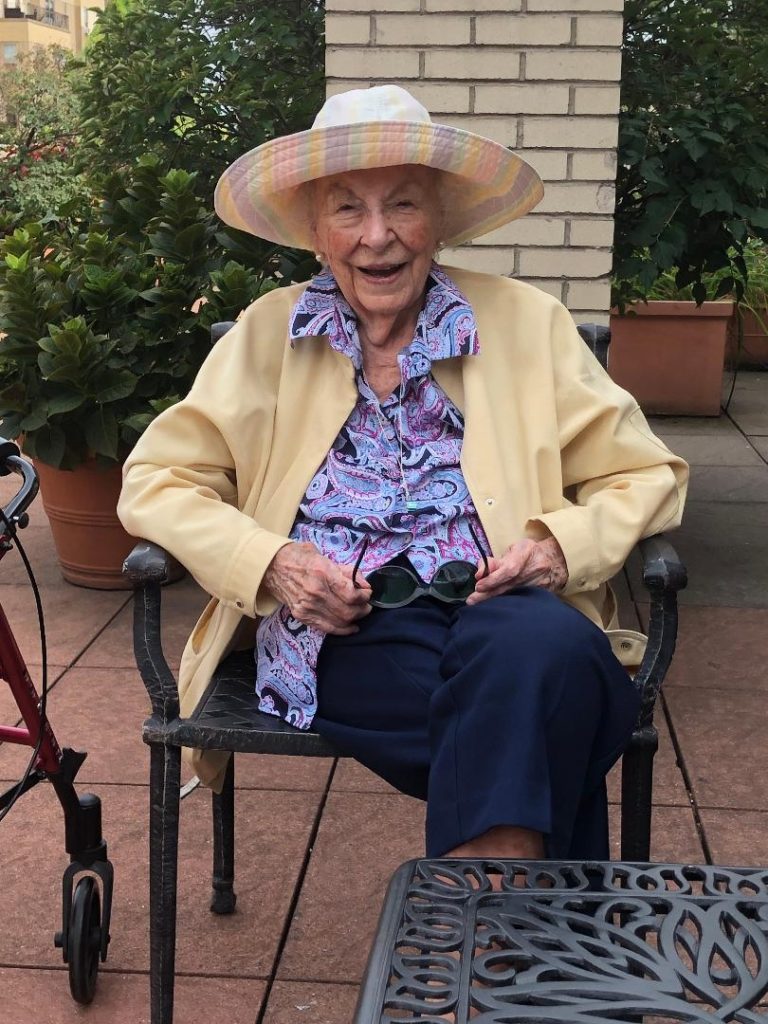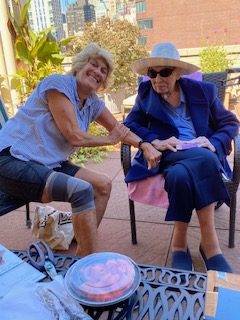The Blessing of a 103-year-old Friend

Roof Days with Marge shamelessly echoes Tuesdays with Morrie, the 2007 bestseller by Mitch Albom, about “an old man, a young man, and life greatest’s lessons.” This post is about an old woman and a somewhat-less-old woman, and life’s most challenging passage! #successful aging
Marge will be 104 in March. I’m too shy to take notes as I did a few years ago with Zelda. She almost made it to 105.
“Are you writing that book about your old ladies?” a seventy-something cousin asks recently. “I love that idea.”
Where to start? And so, an attempt to take a different tack: a few small bites (bytes?), not a whole book.
My Old Ladies
I call them “my old ladies” lovingly, but some of my peers don’t get it. “Call them something else. No one wants to read about old people.”
And yet, I persist. (If you click here, you’ll find other pieces about them.)
I want to I believe that stories of energetic, engaged women who are 90 years and older might help change the negative perception of what an old lady is and has to offer. Just as gay activists took the sting out of the word “queer” by using it themselves, maybe we can give “old lady” a new meaning.
My old ladies are not just old — doctors see anyone over 65 as old. My old ladies are the oldest of the old — 20 to 25 years older than me, and I am no longer young.
And here’s why I love them and listen to them: When you’re 90 or 100, there’s no pretense, no false modesty, just gratitude for being alive. They don’t care what you call them.
The old ladies I’ve picked up over the last 27 years live courageous, conscientious, and careful lives. I don’t feel like I’m talking to “an old person” — just a wise friend who has lived longer.
That is not to say that I don’t learn from younger women. Wisdom is earned, by some earlier than others; by some, never. However, only an older person can reflect on the road I’ve not yet traveled — a territory none of us is eager to traverse (unless we consider the alternative!).
I picked up my first old lady, Henrietta, when I was 50, she 75. Admittedly, I felt a combination of shock and self-pride when a 19-years-younger friend admitted that she thought of me as her old lady. She wants what I have when she’s 77, just as I want what Marge has — if I’m lucky — when I turn 103.
Apartment Visits, Phone Calls, Face Time, and the Roof

I met Marge when she was surrounded by a group of fellow residents on the roof. She is a legend in our building. We didn’t actually talk until a few months later at the annual holiday party in the lobby. Coincidentally, it fell on the 75th anniversary in the building.
“We moved in two days after Pearl Harbor.”
I was immediately intrigued — by her presence, her easy conversation, and her wit.
As she finished her turn at the buffet table, I pointed to the plate of food perched on her Rollator seat and said, “Better not forget and sit down.”
“Oh, thanks for the reminder,” she answered, smiling in a way that said, I’m in on the joke.
Actually, she was way ahead. “Then again,” she added, “I like to make an impression.”
In the five years since, we’ve had many laughs and many conversations. We’ve gone out to lunch and once got flu shots together at CVS. We’ve revealed bits of history to one another, discussed the news, and shared ideas. Our relationship is a gift that keeps giving.
On roof days, I call Marge. “Are you going up today?”
When it’s too hot, too cold, or raining, I pop in for a short visit. “I’Il leave the door open for you,” she promises.
Or, we talk on the phone.
Last December year, when I moved to Paris, I broached the idea of Face Time, explaining that it would be “like seeing me on a tiny television screen but it will be on Sati’s phone.”
Marge owns a cell phone only for emergencies. Born a year before the first radio broadcast in the U. S., she remembers her grandmother not wanting to be alone with a radio. She was afraid of “a voice coming out of a box.” Marge isn’t scared, but she’s not fond of most new-fangled tech either. Still, she’s always up for a new experience and, most important, loves to connect.
Roof Days with Marge – the First Installment
This might be the only installment of Roof Days with Marge, but it’s a start…
“Take care of yourself.”
A while ago, a health club I’d joined for its pool offered me a free session in the gym. I love to swim, I walk for miles, but I’ve never been a fan of “working out.” Never one to turn my back on a freebie, I contacted the trainer. She asked me to email my “goals.”
I call Marge — who works with a trainer twice a week — whenever my inner brat needs a pep talk or at least a dose of her perspective. She had a quick — and perfect — suggestion: “Tell them your goal is to keep what you have!”
Marge is my old-age idol, fiercely independent and capable. She’s proud of still doing for herself what younger folks often take for granted. She does everything except heavy housework — plans her meals, calls the supermarket, orders in from her favorite neighborhood haunts, and keeps her house in order.
She can still get in and out of a bathtub (“because my legs are strong”). Besides regular check-ups, she monitors her habits and reads several health newsletters to stay current. Recently, she realized she needed to drink more water. So she did.
“The only problem now is my walking,” she laments. “I’m not doing enough.”
I get it; I have a similar reluctance to do strength-training. (I did the free training session only.)
But where I fret, Marge acts. To get better at walking, she’s already made plans with her part-time housekeeper. “I told Sati yesterday that whenever she’s here, and it’s a nice day, we’re going to walk.”
I want to know her secret. How does she motivate herself? “I have to try to do better, because I don’t want to end up in a wheel chair.”
“You have to remember your needs.”
Marge tells me her beloved nephew will soon be visiting her from the Midwest. She is happily organizing a a lunch for him and other family members. Since COVID, she has been more housebound than before, but she still manages to get out. She has restaurants where she’s known and doted on, but some of them are off limits now.
“I like Toledo,” she explains referring to a Spanish restaurant walking distance from our building, “There are no steps. So that’s where we’re going.”
Marge knows her capabilities and her limits, and she’s not shy about saying “no” or expressing her needs. If she’s not up for company or ready to leave, she says so. If she needs help, she asks. And when she doesn’t, she says, “Thanks, but I can do it myself.”
“The mind is the most important thing.”
Yesterday, as I was telling a story to a small group of fellow residents on our roof, Marge, sitting to my left, filled in a word I failed to retrieve.

“Wow!” I said, turning toward Marge. “I must be in pretty bad shape to have a 103-year-old woman help me remember my own words!” We laughed about it again later that evening when we talked on the phone.
Marge remembers names and details of stories that I’ve told her and since forgotten! She has a Kissinger-like command of finance, politics, and current events — and she’s five years older!
Marge gave up managing her grandchildren’s trust funds when she was 99. “I still have all my marbles, but I didn’t want to take a chance that I might lose their money.” She still handles her own portfolio, reads the New York Times daily and Barron’s every Saturday. No doubt, her marbles are there.
The mind is the most important thing. Having a good mind can’t make you immune to disease or unexpected trauma but it makes for better coping skills. A good mind reminds you to eat well, to go for a walk, to pick up a phone. It gives you the thoughts and words to have conversation, to connect, to pursue interests — in Marge’s case, the stock market. To have all your marbles is a wonderful thing.
“We could do a lot worse.”
We were talking about our apocalyptic times: the raging floods and fires, the division in the country.
“How lucky we are,” says Marge, reflecting on images she’s seen in the news. “We could do a lot worse. Some people have no power, no gas, no people they can rely on. We are very comfortable. And we have companionship. It’s so important to have people you can talk to.”
I ask Marge if she ever felt “guilty” about living a privileged life. She was born into money, the granddaughter of one of New York’s elite furriers. She married (and lost) two “wonderful” and successful husbands. Through savvy portfolio management, she’s made a lot more money than they left her. She underwrites medical research and donates to organizations that tackle hunger, poverty, and education for those who don’t have her advantages.
“No I don’t feel guilty,” she answers. “I feel grateful. Life is cruel to some people. I know lucky I am.”
◊◊◊◊
If you like what you’ve read, by all means
- Subscribe to my blog. (I won’t charge you or share your email)
- Follow me on social media by via LinkTree